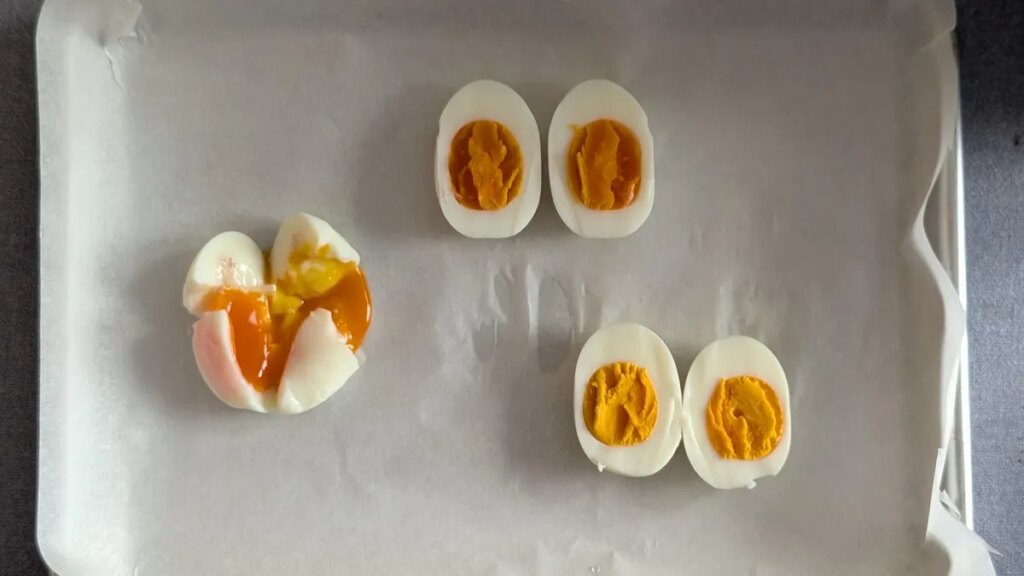Boiled eggs present a quandary about which method is best. There’s a camp that insists you must begin with cold water, bring it to a boil and then set a timer. This method requires near-constant watching to avoid overcooking.
Others insist on dropping an egg into water once it boils, preferring the reassurance of already boiling water when it comes to timing. This method, however, really only works for a small number of eggs at a time. Too many will drop the temperature, requiring you to wait for it to come back to a boil.
If you’re noticing your air fryer giving side-eye from the corner of the kitchen counter…yes, that’s probably actually happening. “Boiling” eggs is easy work for an air fryer of any size, with no boiling involved.
If you’re someone who has ever owned a countertop egg cooker as a singular appliance, then listen up. Your air fryer is already there, being all sorts of useful in its ability to rehabilitate leftovers, roast and bake with abandon and produce stellar grilled cheese. It can also carry this egg-boiling burden for you.
Why you should make hard-boiled eggs in the air fryer
Avoid cooking a full basket of eggs until you’ve perfected the timing and temperature.
A better question is, why shouldn’t you make hard-boiled (or soft-boiled, or any cooked-in-shell) eggs in the air fryer? It’s not like boiling water is adding any flavor to the proceedings, as it would with salted pasta water. Like most tasks you might put the air fryer to, cooking eggs this way yields more consistent results with fewer variables, in less time and with less cleanup involved. I basically gave it a quick wipe out with a paper towel for show once I was finished with the egg cooking experiment.
Read more: This Is How Long Eggs Last in the Fridge and How to Tell When They’ve Spoiled
The case is basically closed, but if you need more reasons, your eggs have a decreased risk of cracking during cooking, which can be caused by being jostled around during a rolling boil. Even the smallest air fryers can manage at least a half-dozen eggs or more. Plus, it’s another tick on the list of reasons to leave the air fryer out on the counter, letting it handle as many kitchen tasks as possible for you.
Best practices for making “boiled” eggs in the air fryer
High heat in the air fryer produces uneven cooking and makes them harder to peel.
From yolks between runny to jammy to hard-cooked, the air fryer can handle it. No waiting for water to boil, no forgetting to set a timer at the key moment. There’s a lot of internet voodoo about dos and don’ts when it comes to boiled eggs in the air fryer, but in my experience, you can disregard most of it. You don’t need to bring eggs to room temperature first. You don’t need a layer of foil as a nest for your eggs. You don’t really even need to preheat the air fryer. (Who started the rumor that air fryers need to preheat anyway? They’re not ovens.)
Here’s what you should do for the best air fryer boiled eggs
- Test with a single egg first to determine the best temperature and timing for your air fryer model. (While I wholeheartedly stand by this method, I wouldn’t go in with a dozen all at once without having tried it out first.)
- Use a low temperature setting, between 270 and 300 degrees Fahrenheit
- Arrange eggs in a single layer
- Set the air fryer timer according to the kind of yolk you seek:
- Plunge cooked eggs in cold water, removing from the air fryer to stop residual heat from taking the yolk any further and to ensure easy peeling
Submerge eggs in cold water after cooking.
Cooking times for air fryer boiled eggs
- Runny yolk: 7-8 minutes
- Soft yolk: 9-10 minutes
- Jammy yolk: 12-13 minutes
- Hard-cooked yolk: 15-17 minutes
Nine minutes in the air fryer produces a perfectly soft-boiled egg.
Mistakes to avoid for air-fryer “boiled” eggs
Don’t fall into the trap of thinking that cranking the heat on the air fryer will allow you to shave a significant number of minutes off the cooking time. While air fryer-boiled eggs take a little less time, as they don’t require waiting for water to boil, they aren’t designed to get the job done quickly. In my experience, a higher temperature in the convection environment of the air fryer caused the eggs to cook unevenly. (Consider that boiling water is only 212 degrees Fahrenheit.)
I read a handful of comments on air fryer boiled eggs that suggested they were harder to peel. I didn’t find that to be the case at all when using a lower temperature setting; however, I did find that to be true for the one egg I cooked at about 400 degrees. It also produced an “eggier” smell while the egg was cooking.
Read more: 8 Foods That Go From Good to Great in an Air Fryer

